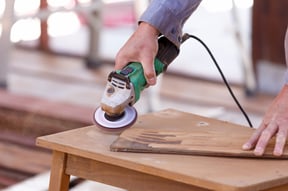 Wood routing is a process that many laymen might not be familiar with, but is well-known among experienced manufacturers. In this process, a wood router is used to reshape wood to fit a specific need.
Wood routing is a process that many laymen might not be familiar with, but is well-known among experienced manufacturers. In this process, a wood router is used to reshape wood to fit a specific need.
Some uses of wood routing are decorative, but the services that Marlin Steel’s manufacturing team focus on tend to be more practical. Examples of wood router-based services that Marlin Steel provides include:
- Wood milling
- Wood check panels
- Check fixture manufacturing
- Wood fretwork and grills
- Routed molds and forms
- Wood check fixture template creation
How might these services affect your own manufacturing process?
Here are a few ways:
Improved Conformity for Welded Parts
One of the key uses of a wood router is to create check fixtures that can hold other objects in place during various operations.
For example, a check fixture can hold steel wires or sheet metal pieces in place while your manufacturing team welds the two objects together. This helps your manufacturing team keep to tighter production tolerances, as each item in a product line is welded in the same places as the one before.
Check fixtures can also be used to check already-assembled products to make sure that they conform to your production tolerances. This go/no go testing can be a fast method for testing if a product is ready for shipment or if it needs reworking.
Both of these uses help to improve your team’s ability to meet production tolerances and avoid having to reprocess parts of an order.
Expertly-Crafted Check Fixtures
There’s an old Fabricator.com article that discusses the benefits of using check fixtures on your production line to check the parts and products your company creates. In the article, it is mentioned that “fixture building is an art that requires experience to do the job right. Otherwise, a lot of money can be wasted.”
In other words, if your company lacks experience in setting up and running a CNC router, you could end up wasting a lot of wood on creating substandard fixtures that don’t provide a reliable measurement of whether or not your products meet your production tolerances. This costs you money not just on the wood, but on labor used to create the faulty fixtures, and time and material used on shipping products that don’t meet your production tolerances.
This is why it is generally better to work with a company that has extensive experience in creating check fixtures.
Precisely-Shaped Molds
Although the term wood routing is used in this article, a CNC router can cut shapes into more than just wood. Other materials, such as plastic, can be carved with a CNC routing machine to produce special molds.
These molds, whether made from plastic polymers or from natural wood, are useful for rapidly manufacturing products from liquid materials that solidify at room temperature. While most metals would be too hot for a plastic or wood mold, some liquefied polymers can work well with these molds.
Which ones? Well, the answer depends on the mold’s material and the liquid temperature of the material being fed into the mold.
Marlin’s degreed engineers have extensive experience in working with different materials and assessing how well they’ll work with different processes. Because of this, Marlin’s degreed engineers are able to pick the right material for your CNC routed mold to handle your production needs. Additionally, they are able to properly adjust the cut of the mold to fit the dimensions of your parts.
Improved Time to Delivery for Your Parts/Products
One of the big benefits of using a domestic U.S. manufacturer such as Marlin Steel for handing your wood routing needs is that the delivery time for your check fixtures and other routed objects is short.
In many cases, an order for routed materials can be filled in under two weeks with expedited domestic shipping. Using a foreign manufacturer often entails weeks of delays as manufactured goods sit in customs, and weeks or months more waiting for overseas shipping.
The faster you get the check fixtures and molds you need, the sooner you can start manufacturing and shipping out your own products.
Overall, wood routing means faster, more efficient production and reduced waste, if the routing is handled correctly.



.gif)


